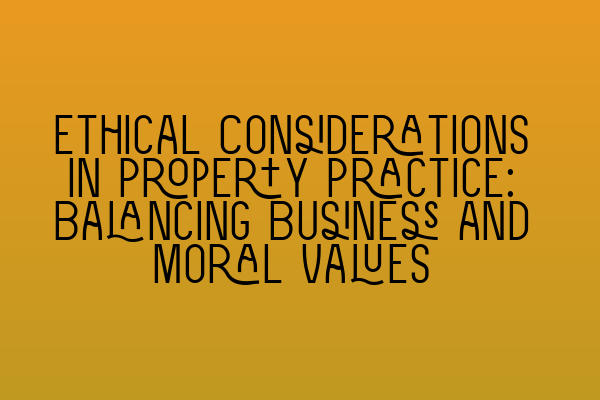Ethical Considerations in Property Practice: Balancing Business and Moral Values
As property lawyers, we have a dual responsibility – to our clients and to society. While our primary objective is to provide legal assistance and guidance in property transactions, it is essential to navigate these matters with a focus on ethical considerations. In this blog post, we will explore the importance of balancing business and moral values in property practice and the impact it has on our clients, the legal profession, and the general public.
Understanding Ethical Issues in Property Practice
In recent years, ethical concerns surrounding property practice have gained significant attention. These issues can range from conflicts of interest and non-disclosure of material information to discriminatory practices and taking advantage of vulnerable individuals. It is crucial for property lawyers to be aware of and address these ethical dilemmas to maintain the integrity of the legal profession and serve the best interests of clients.
One ethical consideration is the duty of confidentiality. While we are obligated to protect our clients’ information, we must also balance this duty with the need for transparency and disclosure. It is crucial to communicate openly and honestly with clients and ensure they fully understand the implications of their property transactions.
Another ethical issue that frequently arises in property practice is the representation of multiple parties with conflicting interests. This situation requires the lawyer to navigate carefully and ensure all parties are treated fairly and given sound legal advice. Transparency and clear communication are paramount in maintaining trust and avoiding conflicts of interest.
In addition, property lawyers must adhere to anti-discrimination laws and actively promote equal opportunities for all clients. Discriminatory practices based on race, gender, sexual orientation, or any other protected characteristics are not only ethically wrong but also illegal. Upholding these values fosters a just and inclusive society.
Implications of Ethical Considerations in Property Practice
Ethical considerations in property practice have far-reaching implications. They can impact the reputation and credibility of individual lawyers, law firms, and the legal profession as a whole. Clients and the public place significant trust in lawyers to make informed decisions and act in their best interests. Failing to meet these expectations can lead to a loss of trust, damage professional relationships, and even result in legal consequences.
Furthermore, ethical lapses in property practice can have severe financial implications for clients. Non-disclosure of material information, for instance, can lead to unexpected challenges and financial losses down the line. By prioritizing ethical considerations, lawyers can help clients make more informed decisions and mitigate potential risks.
Moreover, ethical property practice contributes to the overall well-being of society. Upholding moral values in our work helps ensure fairness, equality, and justice in property transactions. By actively promoting transparency, integrity, and equal opportunities, we create a positive impact not only in our immediate interactions but also in shaping social norms and values in the long run.
The Importance of Striking a Balance
Striking a balance between business and moral values is essential in property practice. While we have a duty to our clients and must provide effective legal advice, it should not come at the expense of ethical considerations. By integrating moral values into our business strategies, we can build stronger relationships with clients, enhance our professional reputation, and contribute positively to society.
To strike this balance, continuous professional development is crucial. Staying updated with the latest developments in property law, including legislative changes and legal challenges, enables us to serve our clients better. Articles like Updates in UK Property Laws: Key Changes and Implications and Legal challenges in property transactions: A comprehensive guide provide valuable insights into the evolving legal landscape and equip property lawyers with the knowledge needed to navigate ethical dilemmas effectively.
Additionally, understanding lease laws is crucial for both tenants and landlords. The article Navigating Lease Laws in the UK: Essential Guidelines for Tenants and Landlords offers essential guidelines for anyone involved in lease agreements, helping us ensure fairness, compliance with regulations, and ethical business practices.
When faced with complex land law issues, proper exam preparation is key. The article Land Law Revision Tips: Ace Your Exam Preparation provides practical tips and techniques to master land law concepts, enabling us to offer accurate and reliable advice to clients while adhering to ethical obligations.
By integrating these resources and continuously updating our knowledge, we can balance business goals with ethical considerations, ultimately delivering better outcomes for our clients and society as a whole.
Conclusion
Ethical considerations in property practice should be a top priority for all property lawyers. By navigating ethical dilemmas, maintaining transparency, and promoting equal opportunities, we not only protect the integrity of the legal profession but also enhance our professional reputation and contribute to a fair and just society. Striking a balance between business and moral values is essential, and by staying updated and continuously developing our professional skills, we can achieve this balance and better serve our clients and society.
